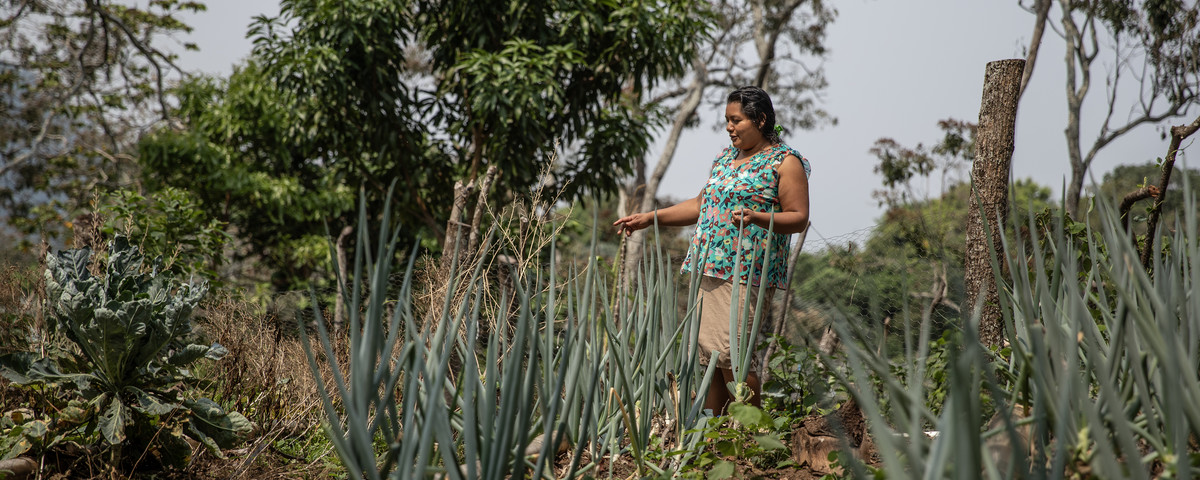Wendy Alicia Martínez is ready to skip two meals a day if it means seeing her daughter become an architect. She made a promise, and she doesn’t intend to break it. Wendy is a small farmer and grows food for her family with the help of her husband, Santos Díaz. She is the mother of two daughters, both already out of high school, and a young son who lives with her in the community of El Rescate, in the municipality of Berlín, Usulatán. Wendy spends most of her time tending the garden that feeds her family, without which they would go hungry. “Everything is so expensive now, and there’s no work,” she says. “My husband and I just laugh.” This is their way of coping with the endlessly increasing prices. “Before, a dollar could get us three to four pounds of potatoes. Now we get four potatoes for a dollar.”
Wendy lives in a two-room home with dirt floors, divided by a small corridor. The whole family sleeps in one room. The other room, the smaller one, is the kitchen. Their garden sits on the slope of a nearby ravine, about a 20-minute walk from their house; there, the family grows green beans, guava, güisquil (a type of summer squash also known as chayote), cucumbers, radishes, winter squash and tomatoes. “To eat, we have to get creative,” says Wendy, who is short and stocky, with cinnamon-colored skin. Harvests are dependent on weather, and a major storm can be all it takes to lose everything and run out of food. In 2022, Hurricane Julia destroyed the family’s entire winter-squash and tomato crop. Wendy worries about the lack of money, but she worries even more about losing her garden. If there’s a harvest, there’s food. But when there isn’t, all bets are on making a little money by working whatever odd jobs they can find.
“We don’t eat meat,” Wendy says, stating the obvious. Recently, her family has also stopped buying eggs, cheese and milk.
She also raises a few chickens: not to eat, but to lay eggs. “It would be amazing to have a monthly salary, to have the luxury of giving my son a dollar to buy some pupusas,” she says. This is what eating pupusas is for her: a luxury. Every day, she feels one step closer to falling into the abyss of poverty. Not a day goes by when everyone in the family is not working, but they don’t always make money or harvest crops.
The family’s situation was compounded when both of Wendy’s brothers were detained under the state of exception and sent to Izalco Prison, where they have been held since their arrest on April 3, 2022. A few days ago, Wendy received confirmation that they will have a court hearing in December. She doesn’t know anything else about their situation, because she doesn’t have the money to travel the 174 kilometers to the prison in Sonsonate, a trip that takes at least five hours by bus. Before their arrest, both of her brothers lived with their parents and farmed a few acres in the community. “I would help them harvest and sell vegetables,” Wendy says. “That would bring in about 40 dollars a week.” After the brothers’ imprisonment, the family lost the farm, since there was no one else to take over the work.
Until a little over a year ago, Wendy and her husband had been earning up to $200 every two weeks. Now, they earn as little as $30 between the both of them in the same amount of time, because the coffee farms that once employed them have stopped hiring. Wendy doesn’t know the reason. This is why they eat less now. This, and because they want to help their eldest daughter, 19-year-old Julissa Alejandra, pursue her dream of becoming an architect.
Julissa recently finished her first semester of architecture school at a private university in the city of San Miguel, a course for which she pays $90 a month on top of the cost of transportation, school supplies, rent and food — expenses that total about $490 a month, well above what her family can afford. But Wendy’s uncle pays for her room and board in San Miguel, and Julissa covers the rest with part-time jobs or hourly gigs, which bring in about $100 a month.
Wendy and her husband work whatever jobs they can get: when he’s not farming the land, Santos, Julissa’s father, works construction. He’s also a bricklayer, which is where Wendy thinks Julissa inherited her interest in designing and building homes. In a country that is more expensive every day, Wendy’s family is pursuing a dream that today seems far away. “With the little she earns, plus whatever we can give her, we’re making the effort, which is our dream, and God willing one day we’ll have achieved it,” Wendy says. “We have to dream, but we have to stay awake while we dream. Even if I have to skip two meals a day, I’m going to see her become an architect.”
| Reporting: | Julia Gavarrete |
| Photography: | Víctor Peña and Carlos Barrera |
| Translation: | Max Granger |
| Web design: | Daniel Reyes, Daniel Bonilla, and Alex Santos |
| English edition: | Roman Gressier and José Luis Sanz |
